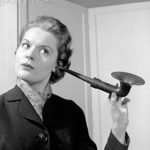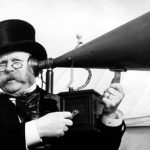communication strategies
Managing hearing loss
The following strategies assist a person with a hearing loss to:
- Understand speech and conversation more effectively
- Improve their sense of personal safety and security
Use your hearing as well as you can
 Listen carefully
Listen carefully - Position yourself near the speaker or the source of the sound
- Make sure your better ear (if you have one) is closer to the speaker or the sound
- Choose a quiet area and avoid or reduce the background noise where possible
- Use amplification such as hearing aids or other appropriate listen devices
use your vision to compensate for your lack of hearing
 Have your vision tested
Have your vision tested- Use lipreading or speechreading
- Watch the speaker carefully for facial expression, gesture and body language
- Visual cues help you understand the speaker as a lot of our communication is non-verbal
- Use print and captions
- Position yourself to your best advantage
use technology to support residual hearing
- Use amplification, hearing aids or assistive listening devices (ALD’s)

- Use an amplified telephone where the handset volume can be increased
- Consider a cochlear implant as a hearing solution when hearing aids are no longer effective
- Use subtitles
- Mute the TV to remove competing noise
- Use other technology for alerting you to the doorbell or smoke alarm
- Hearing aids are now capable of streaming directly to your smart device
strategies and tactics FOR SUCCESSFUL COMMUNICATION WITH OTHERS
- Gain attention first
- Face the hard of hearing person directly at eye level
- Turn down the TV or radio
- Do not speak from another room
- Do not walk away while turning your back
- Speak slower and a little louder, pronouncing your words clearer but don’t shout
- Move closer
- If you are not understood, say the same thing in different words or write it down
- Hard of hearing people manage less when they are tired or ill even when using hearing aids




